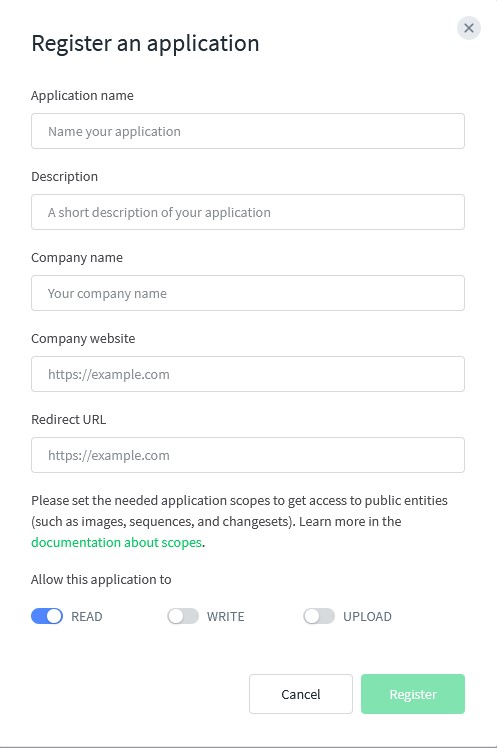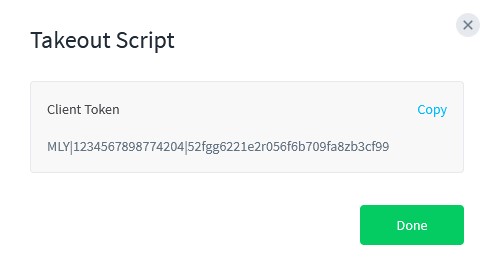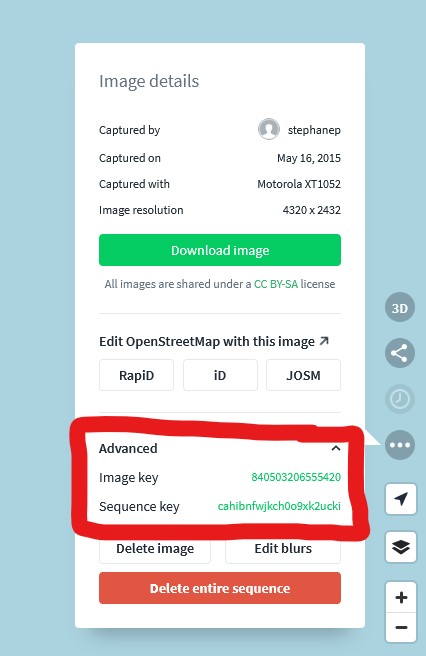|
|
||
|---|---|---|
| doc | ||
| hooks | ||
| .gitignore | ||
| README.md | ||
| batch_get_username.sh | ||
| find_france_photos_and_move.py | ||
| for_futur_me.txt | ||
| get_sequences_of_username.py | ||
| get_user.sh | ||
| images_par_username.py | ||
| mapillary_download.py | ||
| model.py | ||
| requirements.txt | ||
| secrets_variables_example.sh | ||
| text_array_to_download_script.py | ||
| writer.py | ||
README.md
mapillary_download
Simple code to download images in one or several mapillary sequences. The images will be geotagged and oriented.
How to use
Setup env variables
copy the secret variables files to setup your maipllary dev token, and your panoramax OpenStreetMap token.
cp secrets_variables_examples.sh secrets_variables.sh
editor secrets_variables.sh
Get ALL the sequences of SEVERAL users
To avoid to download everything at once, this is a 2 steps process:
-
1/ We set a list of users for which we want to get the list of sequences to download, and get a bash script for each user. Change the list of users in the batch file
batch_get_username.sh. change the access token with your access token and the sequence ids with the ids of the sequences you want to downloadusernames=( "someone_having_nice_pictures" "someone_else" "oh_look_a_these_usernames" ) # use real accounts, it might work betterThis will give you a few files that the other scripts will use to generate a script to download all sequences of each user. One user, one bash script generated.
-
2/ We can launch the download of all the sequences of a user for every user specified in the batch script.
bash script_bash_get_sequences_for_user_SOMEONE.shOr all of the generated batch scripts at once.
bash script_bash_get_sequences_for_user_*
Don't worry if you rerun the same user script_bash_get_sequences_for_user_someone.sh twice, the pictures will not be downloaded twice. Every run of mapillary_download.py checks that pictures are not existing before willing to download them.
Get only one sequence with its ID
To find a sequence id you can use the batch script, or click on a sequence on the Mapillary website, click on a picture, click on advanced data, and copy the sequence ID.
python mapillary_download.py "MLY|xxxx|xxxxxxx" --sequence_ids xxxxxxxxxxx xxxxxxxxxxx
Available arguments
python mapillary_download.py -h
usage: mapillary_download.py [-h] [--sequence_ids [SEQUENCE_IDS ...]] [--image_ids [IMAGE_IDS ...]] [--destination DESTINATION]
[--image_limit IMAGE_LIMIT] [--overwrite]
access_token
positional arguments:
access_token Your mapillary access token
optional arguments:
-h, --help show this help message and exit
--sequence_ids [SEQUENCE_IDS ...]
The mapillary sequence id(s) to download
--image_ids [IMAGE_IDS ...]
The mapillary image id(s) to get their sequence id(s)
--destination DESTINATION
Path destination for the images
--image_limit IMAGE_LIMIT
How many images you want to download
--overwrite overwrite existing images
-v, --version show program's version number and exit
Sort pictures depending of a bounding box in their Exif GPS Data in a separate folder
This is used to restrict zones for national instances of Panoramax to upload to reuse the sequences of multi national users.
Edit the bounding boxes in find_france_photos_and_move.py and change the destination folder.
Running the script will check in the /data folder for every user sequences and move the files being in the bouding boxes in the destionation folder path of the script.
For this script to read the exif of pictures, you will need the python package exifread
It was tested with pictures taken with the App Open Camera.
How to get my Mapillary access token
-
Click on "Registrer Application", enter the needed informations, enable the application to "Read" data, then click on register :
-
When this registration is done, click on "view" in the token column. This is you access token :
How to get my sequence id (or sequence key)
-
Click on one of the picture of the sequence you want to download
-
Click on the "image option" button (right panel)
-
Click on "advanced" then click on the sequence key to copy it in the clipboard
How to install the script with a virtual environnement
cd ~
git clone https://github.com/Stefal/mapillary_download.git
cd mapillary_download
python3 -m venv mly_venv
source mly_venv/bin/activate
python -m pip install -r requirements.txt
Then you can run python mapillary_download "MLY|xxxx|xxxxxxx" --sequence_ids xxxxxxxxxxx
When you're done with the script, simply run deactivate to exit the virtual environnement.
On windows you can create a virtual environnement too, or use the prebuilt mapillary_download.exe available on the release page.
How to batch the upload to panoramax
After having downloaded the sequences of a user you will find them in the folder data.
go in your data folder, and to the user subfolder, and assuming you have already sent pictures with geovisio_cli, you can run this command to send all the sequences of the current folder you're in:
cd data/some_user
for dir in */; do dir=${dir%?} ; geovisio upload --api-url https://panoramax.openstreetmap.fr "$dir" --token=BLAH_BLAH ; done
Have fun!


